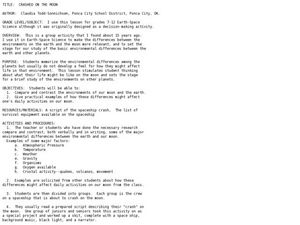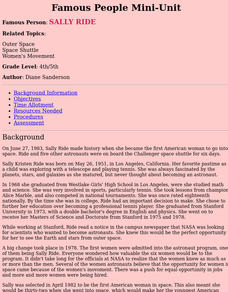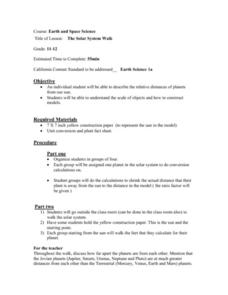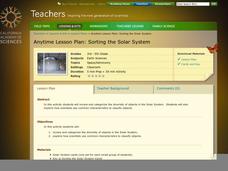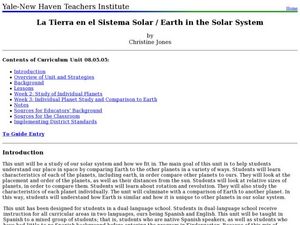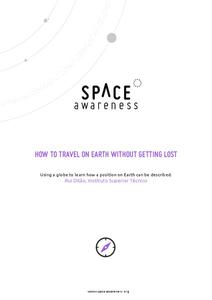Curated OER
Mercury, Venus, and Earth
Students learn information about the planets Mercury, Venus, and Earth by playing a trivia game.
Curated OER
TE Activity: A Roundabout Way to Mars
Students investigate Hohmann orbit transfers using cardboard and string while focusing on the orbits of Earth and Mars. They look at the planets orbits around the sun and transfer orbit form one planet to another to determine what a...
Curated OER
Crashed On the Moon
Students compare/contrast the environments of our moon and earth, and examine examples of how these differences would affect their daily activities on our moon. They develop lists of emergency supplies to bring if their spaceship crashed...
Curated OER
NASA Robots
Learners investigate how robots are used in space. In this space science lesson, students participate in an experiment using a blindfold and complete assigned tasks. The learners demonstrate how robots are "thinking" machines.
Curated OER
Jupiter's Weather Forecast
Students read information about Jupiter and the planet's weather. In this Jupiter weather lesson plan, students read information about Jupiter's weather. Students study a chart about the weather on Earth and Jupiter. Students read a...
Curated OER
Land Safely...
Students model the preparation needed for a soft-landing on a planet or object in space. They do this by packaging a raw egg with certain material, and dropping the egg from a given height to test the packaging effectiveness.
Curated OER
Impact Craters
Young scholars investigate the factors affecting the size of a crater. In this space science lesson, students collect data from the activity and graph them. They explain how velocity of impact relate to crater size.
Curated OER
SALLY RIDE
Pupils express what it would be like to launch off into outer space in a space shuttle. They include what it might feel like, look like, sound like, and any thoughts that go through their mind as they dart away from the Earth's atmosphere.
Curated OER
Great Explorations: To the End of the Earth and Beyond
Students analyze the factors that affect exploration such as religion, trade, territorial expansion, and science. In this Great Explorations lesson, students determine the names of famous explorers as well as their routes and...
Curated OER
Voyage: A Journey Through Our Solar System
Thoroughly written, this plan walks you through every detail of having your high school astronomers design scale models of the solar system. Complete instructions on building to scale, lesson plan procedures, and associated worksheets...
Space Awareness
Meet Our Home: Earth
Earth is a complex structure. Learners explore their home, the earth, using a fun hands-on activity. They create tactile models of the earth using ordinary household materials that represent some common features: land, polar caps,...
Curated OER
The Solar System Walk
A unique lesson on the solar system, and some of the mathematics associated with it, is here for your high schoolers. Pupils are put into groups of four, and each group is assigned one of the planets from our solar system. They must...
Curated OER
Our Solar System - Comparing Planetary Travel Distances
NASA presents a mini-unit on distances in our solar system. It incorporates scientific concepts of gravity, mass, density, and payload while your aspiring astronauts also employ mathematics skills. They calculate speed, they determine...
University of Colorado
Phases of Charon
Pluto, although no longer considered a planet, has five moons. Pluto's moon, Charon, is the focus of a resource that describes how the moon is viewed from the surface of Pluto. Photos help individuals see how Charon would look at...
California Academy of Science
Sorting the Solar System
Scientists are always sorting and classifying objects based on their characteristics. In a hands-on learning activity, young space explorers work together to categorize solar system cards based on their properties. It is up to the...
Curated OER
Exploring Mars
Learners, working in small groups construct scale models of the planets and solar system. They examine images of Mars and discuss what might have caused the features. They record facts about their planetary research in their journals and...
Curated OER
Solar System
Young scholars research the nine planets on the internet using the provided links. They also search for pictures of each of the nine planets and use these pictures to create a PowerPoint slideshow. Finally, they prsent their slideshow...
Curated OER
Earth: Our Big Blue Marble
Students investigate Earth and its resources. In this Earth, space, and nature lesson plan, students collaborate to design presentations on the Earth, its cycles, and how humans have impacted the planet. Images, diagrams, and background...
Curated OER
Earth in the Solar System
A three-week unit designed to be completed in an elementary level, dual-language immersion classroom, this resource includes several lessons intended to introduce young learners to the solar system, the Earth and how the Earth compares...
Space Awareness
Oceans as a Heat Reservoir
Oceans absorb half of the carbon dioxide and 80 percent of the greenhouse gases released into the atmosphere. Scholars learn how and why the oceans store heat more effectively than land and how they help mitigate global warming. Pupils...
Space Awareness
What is a Constellation
Why do some stars in a constellation appear brighter than others? Using a get-up-and-move astronomy activity, scholars explore perspective and the appearance of constellations in the sky while developing an understanding of the...
NASA
The Discovery of Jupiter Radio Waves
Lead your class on a journey to the planet Jupiter and provide them with fun facts in the process. Learners explore radio waves emitted by Jupiter to further understand how this data helps our daily lives. They conclude by discussing...
NOAA
Technology I
Isn't technology great? The 12th installment of a 23-part NOAA Enrichment in Marine sciences and Oceanography (NEMO) program introduces technology that marine scientists use. Pupils take part in an activity using conductivity,...
Space Awareness
How To Travel On Earth Without Getting Lost
Have you ever wanted to travel the world? Take a virtual trip with a geography lesson that uses longitude and latitude, the position of the sun, an astronomy app, and a classroom globe.


